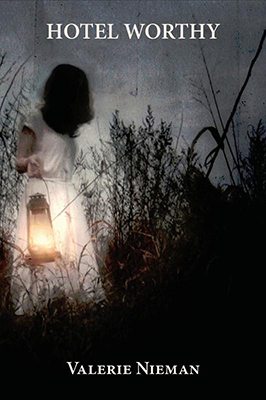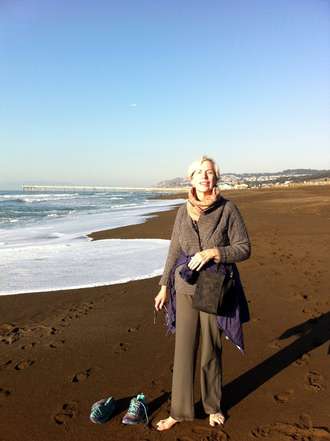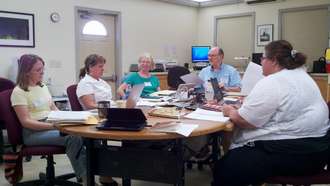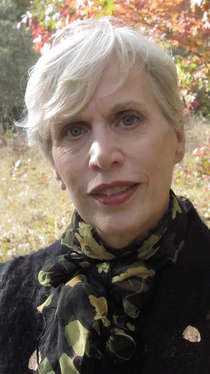
03 Mar Discovering Author Valerie Nieman
Acclaimed North Carolina writer Valerie Nieman will be teaching The Breath of Life: Discovering and Depicting Characters at the Folk School, July 5-10, 2015. This month brings the release of her second poetry collection, “Hotel Worthy.”
CP: How long have you taught at the Folk School?
VN: Hard question! I don’t have a great memory for dates. Several years ago, anyway. I began by teaching weekend character development classes and then graduated to a week-long fiction session in 2013. In 2014, I taught a weekend workshop and then spent a week taking a woodworking class – my first taste of being a student at John C. Campbell. What fun! I produced two lovely occasional tables, though I had never before worked with any power tools beyond a drill. The Folk School method definitely works.
CP: What is your favorite Folk School memory?
VN: Can I offer a quilt?
The magnificent elm tree in front of the Orchard House. Cracking thunderstorms. The Whipstitch Sisters rocking the house. The coal-smoke smell from the Blacksmith Shop. “Simple Gifts” sung by a chorus of hungry workers. Purple martins. River cane whispering near the stream. Morning Song. Smiles – always smiles! Enticing smells of Indian cooking emanating from the Cooking Studio. Cohosh berries – “doll’s eyes” – beside the path. Learning to contra dance. Bees working the gardens. Creaking floors at the Keith House. The dinner bell. Mist on the fields. The sound of hammered dulcimers. Wild blackberries!
CP: Why do you like teaching at the Folk School?
VN: The Folk School philosophy is very close to my method of teaching writing at North Carolina A&T State University and elsewhere. I often have classes with very mixed levels of experience and ability. My approach is to take each student where he or she is, and help each one to move to a new level of understanding and accomplishment. In the classroom, I don’t grade one student against another, but grade them against themselves. The non-competitive approach that works with adult learners at Campbell works equally well with undergraduates, and vice versa.
I also find myself nourished by the time I spend at the Folk School. I encounter all sorts of new art forms, talk with fascinating people, even learn new skills. It’s like a deep drink of spring water on a hot day. As full as I am with anticipation upon arriving, I never leave without feeling that my heart and soul have expanded even more, and are brimming over.
CP: Your class is listed as appropriate for the intermediate to advanced writer. How much experience should a student have to consider your class?
VN: Students should have done some writing, though not necessarily for publication. If they have been working on a family memoir, that’s great. If they have taken fiction workshops, excellent. And if they are publishing already, that’s wonderful. We work through exercises to open up the storytelling process. As long as students have the basic tools of narrative and the desire to write, then writing will happen. I never fail to be surprised and delighted by the stories that emerge, and I treasure the supportive feeling around the table at Orchard House as writers reveal their gift and help others find theirs.
Hotel Worthy
 “Hotel Worthy” is now available for pre-order from Press 53 and on Amazon.
“Hotel Worthy” is now available for pre-order from Press 53 and on Amazon.
Here’s what others have to say about this book:
Joseph Bathanti: “There abides in its pages an uncanny past wrought into poems that spring from a memory – from a vast, liturgical acumen – that unites the dead with the living, restores the abandoned, returns the missing. This is a startling book. The language – its lyric nuance, its plaintive harmonies, its ceremonial beauty – is unforgettable.”
Sarah Lindsay: It’s a pleasure to hear the quiet, sure voices of these poems, to be caught off guard when some swoop wide at the end like the trumpets of lemon lilies, to be reminded that “the personal . . . holds hands with the larger all the way up.”
Ansel Elkins: Like a daring archeologist, the poems of Hotel Worthy dig [deeply] into the intimate layers of years, excavating the fossils of memory, love, loss, and family history. These poems compel us to have the courage to emerge from our past shipwrecks and embark anew.
Marc Harshman: From the moment I read the title poem’s breathless rush of poignant reflections, I knew I was in the presence of a poet keen to explore life with searing honesty. Prepare your heart – these are poems that matter.
Glenna Luschei: Valerie Nieman writes so intimately that I wondered if I had written her poems and I wish I had. Read this book for the surprising images folded into a remarkable journey.
About Valerie
An update on where I’ve been as a writer during the ten years that this book came together. I was a 2013-2014 North Carolina Arts Council poetry fellow, with earlier grants including an NEA creative writing fellowship and others in West Virginia and Kentucky. My awards include the Greg Grummer, Nazim Hikmet, and Byron Herbert Reece poetry prizes. I’ve published three novels: Blood Clay, a novel of the New South, honored with the Eric Hoffer Prize in General Fiction; Survivors, a novel about the Rust Belt of the 1970s; and my first book, Neena Gathering, newly reissued as a classic in the post-apocalyptic genre. A fourth novel, Backwater, is now in submission, and I am at work on a new novel and doing research, including a month-long solo ramble in Scotland. I have also published ac ollection of short stories, Fidelities. A graduate of West Virginia University and Queens University of Charlotte, I was longtime journalist but now a professor of creative writing at North Carolina A&T State University. I was a founding editor of Kestrel and currently the poetry editor of Prime Number magazine.
Visit Valerie’s website for more information.
The Breath of Life: Discovering and Depicting Characters (July 5-10)
Characters who will live and breathe in the reader’s heart must first live and breathe in the writer’s mind. Discover how to expand characters into fully rounded beings, using intuitive and conscious methods to discover their essence. Delve into characters through techniques such as clustering, building from scenarios, developing fictional resumes, naming, and creating complete characters through moral dilemmas. Also explore how to best depict characters through dialogue, description, and narrative. For intermediate to advanced fiction & nonfiction writers. Register today







No Comments